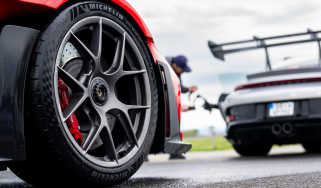BMW M3 vs Mercedes-AMG C63 S - evo Deadly Rivals
Two four-door heavyweights go head-to-head on track
The BMW M3 and Mercedes-AMG C63 S have both ditched natural aspiration for downsized twin-turbocharged engines, making them more powerful and efficient than their predecessors. On paper they both move the game substantially on, but in our latest video, we're eager to find out which is faster around a lap.
Somehow, the BMW M3 manages to swap issues with traction and damping on the road for supreme composure and accuracy on track. Dan Prosser needs just a few laps on the silky smooth asphalt of Bedford Autodrome to confirm that, in this environment at least, it’s amongst the very fastest four-doors on sale.
Precise as the M3 may be, its key rival, the AMG C63 S, harnesses substantially more power from its ‘hot V’ twin-turbo 4-litre V8. Power peaks at 503bhp and torque reaches 516lb ft, which comfortably beats the 425bhp and 406lb ft of the M3’s twin-turbocharged 3-litre straight-six.
But here’s where things get interesting, because the 1655kg C63 is also significantly heavier than the 1560kg BMW, ensuring both cars are separated by just a tenth when accelerating from 0-62mph (the C63 S just wins with 4sec to the M3’s 4.1sec).
The result is an immensely close battle, with these two heavyweight saloons representing either brute force or precision. It’s almost impossible to accurately pick a winner, so let’s hand it over to Prosser and contributing editor Richard Meaden to reveal the fastest…
Specifications
BMW M3
| Engine | in-line 6-cyl, 2979cc, twin-turbo |
| Power | 425bhp @ 5500-7300rpm |
| Torque | 406lb ft @ 1850-5500rpm |
| 0-60 | 4.1 (claimed 0-62) |
| Top Speed | 155mph (limited) |
| MPG | 32.1 (claimed combined) |
| Lap time | 1min 23.3sec |
Mercedes-AMG C63 S
| Engine | V8, 3982cc, twin-turbo |
| Power | 503bhp @ 5500-6250rpm |
| Torque | 516lb ft @ 1750-4500rpm |
| 0-60 | 4.0sec (claimed 0-62) |
| Top Speed | 155mph (limited) |
| MPG | 34.4 (claimed combined) |
| Lap time | 1min 24sec |
Winner
Told you it'd be close. The M3 takes the win by just seven-tenths, confirming that, on this day at least, lighter weight and more responsive controls are better suited to the track than an overall power advantage.
But perhaps more importantly, what this battle reveals is that despite their switch from atmospheric to forced induction, these two German rivals are still incredibly capable and characterful machines.
On the road, it's even more difficult to seperate these two super saloons. For our full on-road verdict, check out the August 2015 issue of evo Magazine (evo 211).


